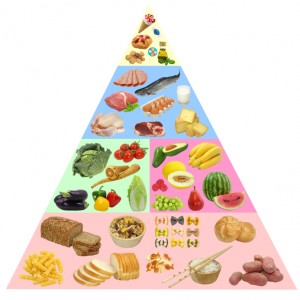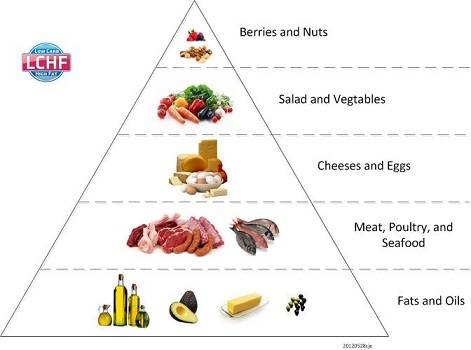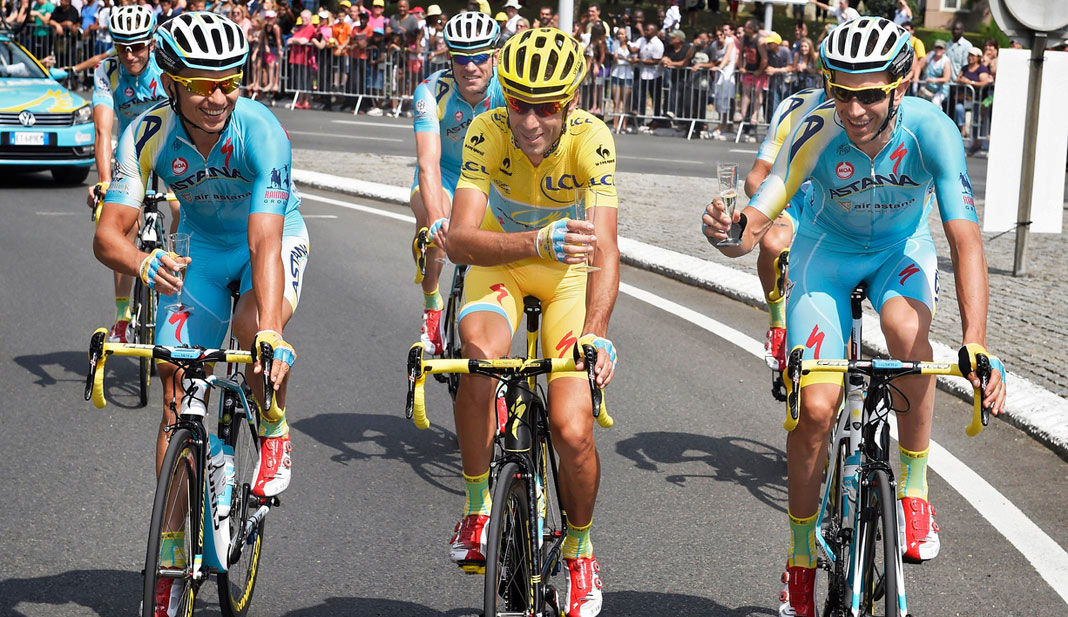I have been hearing a lot more about low-carb-high-fat (LCHF) diet regimes, so decided to find out more.
It appears that the standard advice on diet that we have been receiving over the last 30 years may be wrong.
It appears that the standard advice on diet that we have been receiving over the last 30 years may be wrong.
Background to current dietary advice
Since the 70s, diet advice for health has been to eat whole grains and starchy foods, to avoid fat and particularly saturated animal fat, eat a lot of fruit (such as five portions per day). The model is represented as a food pyramid, with bread and pasta at the bottom, vegetables and fruits in the middle and meat and dairy at the top.

The traditional model for healthy eating has coincided with a great increase in metabolic disease. Advocates of the low carb diet regime say that this model of nutrition is wrong.
For weight loss the traditional advice is to expend more energy than you consume. 'A calorie is a calorie', no matter if it is from sugar or beef. In 2014 this is the advice you would be given by most doctors and nutritionists. There is some very credible research that shows that this is wrong.
Latest thoughts on diet
The latest research indicates that:
New recommendations for diet
As a result of these findings, some nutritionists and doctors are recommending that the general population changes the way they eat as follows:

The food pyramid has been reversed. Real foods are more satiating and stop blood sugar spikes. However if the whole planet tried to eat this way there would probably be a food shortage. Eating like this isn't cheap and requires planning.
The evidence and logic behind this way of thinking appears to be compelling. There are plenty of studies which are disproving the old dogma. The people who are recommending changes to our diets are facing a lot of resistance from the food industry and the established nutritionists. They are likening the struggle to that against tobacco 50 years ago.
Certainly it appears that the normal person who might not exercise much and have a bit of a belly could benefit from reducing carb (especially sugar) intake. But what about cyclists?
Could a low carb high fat diet benefit cyclists?
Most keen cyclists ride for hours on end burning thousands of calories. A 4 hour ride might burn 3000 calories. We are often quite skinny although there are a lot of cyclists with big bellies. Since we burn a lot of energy, we eat a lot of carbs.
Could a low carb diet be useful to cyclists? Wouldn't such a diet be the worst thing for a racing cyclist to consume?
Professor Timothy Noakes explained how such a diet could work for elite endurance athletes as follows:
He cited triathlete Mark Allen who said that he'd been eating a carbs:protein:fat ratio of 40:30:30 during the peak of his career when low fat diets were all the rage. (Note: apparently Mark said that 40:30:30 was just a starting point, and that he listened to what his body wanted).
I am generally in agreement with Professor Noakes, although I would not recommend a carb restricted regime for road bike racers (2-7 hour races). The reason is that road races are not steady state events. There are bursts of intense power output followed by periods of zero power output. The energy requirements of these bursts fall easily into the 1km pursuit category and definitely into the <30 minute category. To handle that kind of power output you need to be burning carbs.
Furthermore, it is not practical to consume fat and protein during a ride, since they take too long to digest. Carbs remain the best option for event fuelling and post-event recovery.
For long, steady-state events, such as a long time trial, triathlon or ultra event, becoming a fat burner appears to be a good way to go.
What should we be eating?
During normal life, i.e. most of our day, the evidence appears to point towards restricting carb intake. Cutting back on sugar and carbs will teach your body to burn fat as a fuel source and will yield numerous health benefits as sugar spikes will be minimized.
Before races and training, I recommend eating slow release carbs such as oats, muesli or dense brown bread. Eggs and fish are also easily digested and contain protein and fat which is useful during the event. I’ve not had any stomach troubles with eating these more than an hour before exercising hard.
During races you should go with high GI carbs, since they are easily burnt as fuel. There is some evidence that water is the best thing to drink rather than sugared energy drinks, as the sugary drinks can switch your body into sugar burning which depletes your stores too rapidly. Most Tour de France types prefer water, and they probably know what works best. They will only reach for gels and energy drinks towards the end of a race. Immediately after the race, within 30 minutes, it is a good idea to eat carbs as they will be digested rapidly which will repopulate your stores for the next day.
Sources of fat include nuts (not peanuts or cashews as they contain a lot of carbs), saturated animal fat (grass fed beef has better quality fat than grain fed beef), coconut oil, avocados, butter, full fat milk and cream (note that dairy contains a lot of carbs in the form of lactose, so go easy), oily fish.
This should be eaten with fibrous green vegetables such as salad, broccoli, kale, fermented vegetables (good for gut health) and seasonal fruits. Avoid fruits such as bananas, grapes and mangoes as they are high in sugar.
Keep servings of bread and pasta to a small size. Mark Cavendish says that he only eats a small serving of these carbs after races.
Don't eat vegetable oil and margarine and make dessert an occasional treat. Avoid drinking much alcohol.
Don’t stuff yourself as no matter how 'healthily' you are eating it will still make you fat.
Conclusion
There is a lot to be gained by reducing the amount of carbs in our diets. I have noted that a lot of cyclists/endurance athletes have a sweet tooth, which leads to bonking, weight gain and insulin resistance (e.g. Steve Redgrave became diabetic despite being one of the all-time greatest rowers).
Reducing carbs should lead to better health and performance.
The low carb movement will gain pace, but I suggest that we continue to eat some carbs and as Mark Allen said, listen to your body.
Links
Some anecdotes from Tim Noakes about LCHF and weight loss
Challenging Beliefs: Memoirs of a Career
Dr. Bernstein's Diabetes Solution: The Complete Guide to Achieving Normal Blood Sugars
Blood Sugar 101: What They Don't Tell You about Diabetes
Wheat Belly: Lose the Wheat, Lose the Weight, and Find Your Path Back to Health
EAT-FAT ∆ GET-FIT Essentials: Low Carb Made Easy - Learn to Thrive Rather than Merely Survive in Less than 60 Minutes
Fat Chance: Beating the Odds Against Sugar, Processed Food, Obesity, and Disease
